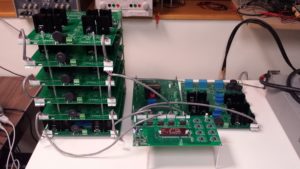Currently, several research projects are underway at the EMPE lab.
- ASCEND Project: All-electric propulsion system targets reduced aircraft greenhouse emissions. Read More…
- Motor fault diagnosis by monitoring motor current signature analysis (MCSA)
- Stator Windings Ground Fault Detection in Synchronous Generators
- Magnetic Gears and Magnetically Geared Machines
- Fractional Slot Concentrated Winding (FSCW) Configurations for Induction Motors
- Fault Tolerant Control of Five Phase Motors
- Investigating the Effects of a Motor’s End-winding Flux on an Adjacent Magnetic Gear
- Exterior Switched Reluctance Motor Design and control for traction application
- Design of permanent magnet generator for flywheel applications
Here are some explanation, photos and videos of current ongoing projects in the lab
ASCEND Project

Researchers at Texas A&M University are advancing the ASCEND project to develop an all-electric propulsion system for single-aisle commercial aircraft, aiming to reduce greenhouse gas emissions and noise pollution with innovative, lightweight, and ultra-efficient components. Read More…
- Phase one: Develop the design and model for an all-electric powertrain
- Phase two: Achieve a fully integrated powertrain with a power density of 12 kW/kg or greater and 93% efficiency, focusing on development and implementation

The all-electric powertrain will be comprised of electric motors, drives and associated thermal management systems.
| Image: Photo courtesy of Dorsa Talebi
Motor fault diagnosis by monitoring motor current signature analysis (MCSA):
- MCSA is used to detect different types of motor fault including stator winding faults, rotor faults, eccentricity related faults, and bearing faults. Depend on processor computational performance and motor operational environment, the measured motor current analysis algorithm is chosen. The frequency domain fast fourier transform (FFT) algorithm is popular in MCSA fault detections. Frequency-Time analysis such as short time fourier transform (STFT) and wavelet is used for inverter-fed motor for their high computational performance especially during transient. Simple methods using reference frames theory can also be used and implemented in motor drives. With the development of power electronics devices and microcontrollers, most of the motors are preferred to be driven by a converter which can process fault diagnosis algorithm. Unlike utility driven motor monitoring the current of inverter-fed motor is quite noisy which can mask the fault signatures and cause a false fault alarm.
“Stacked Partial Resonant Universal Converter”

Exterior Switched Reluctance Motor Design and control for traction application

Operation of a prototype axial field magnetically geared machine designed and fabricated by the EMPE lab with machining help from Vilas Motor Works: